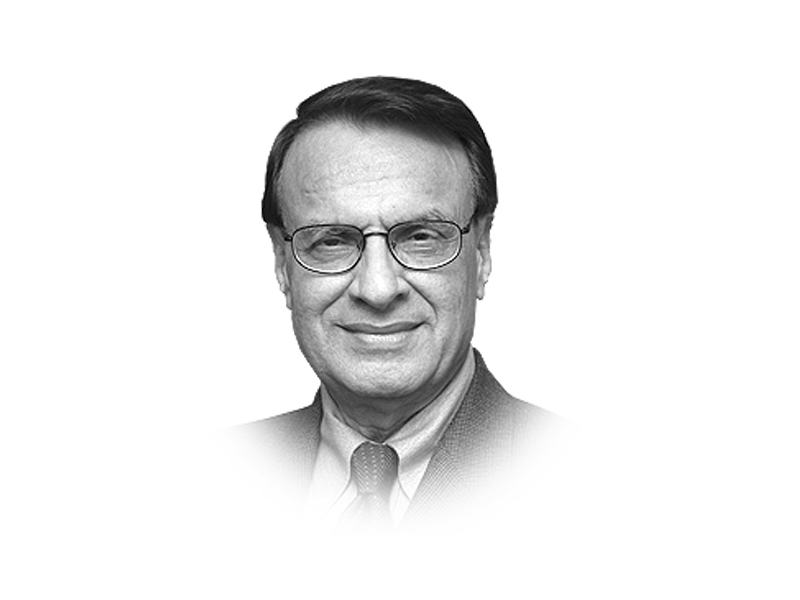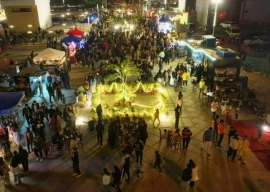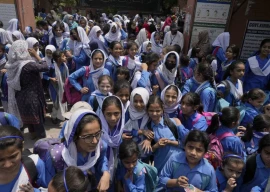
During five years of the NRO-based civilian rule, neither democracy took root in our country nor did people experience any socio-economic upturn. Instead, they found themselves stuck at the crossroads of another critical juncture suffering the worst-ever governance crisis of their history. The country drifted deeper into an abysmal political chaos and economic uncertainty. The common man’s life could not be more miserable with spiralling food and energy shortages, unabated violence and countrywide lawlessness. It was the worst form of kleptocracy in which the government existed only to aggrandise the personal wealth and political power of the privileged few.
No wonder, democracy now strikes back with real vengeance; this time, throwing out the entire ruling political hierarchy. The post-Bhutto Pakistan Peoples Party stands almost routed from the political scene. Besides giving an emphatic victory and a popular mandate to the Pakistan Muslim League-Nawaz (PML-N) as Pakistan’s largest political party, the May 11 election has placed in our political cradle an infantile newcomer in the form of the Pakistan Tehreek-e-Insaf (PTI) as a potential future player in the country’s politics. Despite the usual post-election bickerings over alleged polling irregularities, democracy decisively restores the PML-N to the political pre-eminence that it enjoyed until it was overthrown by former president General (retd) Pervez Musharraf in October 1999.
This is going to be a fateful transition in the country’s history. The PML-N with the experience of two previous unfinished terms, a seasoned and mature leadership and an elaborate party manifesto is now poised to take on the challenges of its renewed mandate. It has been called upon to lead the nation during one of the most difficult and crucial phases of its independent statehood. The task ahead is not going to be easy. The vast array of problems inherent in the crisis engulfing the country are a daunting legacy of domestic and external challenges for any newly-elected government to overcome.
We surely need a strong economic team with a merit-based, professionalised public sector cadre and small but efficient performance-led federal and provincial cabinets for effective handling of the economic and energy crises and dreary law and order situation. Our rulers must realise that our problems are at home. Their solutions are also at home, not in Riyadh, Dubai, London or Washington. Homegrown solutions inter alia include, tightening of belts to reduce governmental spending and borrowings, controlling inflation, rationalising of GDP targets, restoring macroeconomic balance, banning non-essential imports and luxuries to reduce the trade gap.
Self-reliance, simplicity and austerity must be the cardinal principles of our national life in all spheres. Loans are not capital; they are a liability. Foreign aid and loans must be dispensed with by harnessing domestic material and human resources. This would require maximising our agricultural and industrial output, revival of the moribund textile industry and optimum exploitation of our untapped natural wealth. Corruption must be rooted out from all segments of society and at all levels of government and its institutions through an independent and transparent accountability process. The VIP culture involving lavish perks and privileges and provision of luxury cars to all public office-holders, elected or unelected, civilian or military, must be abolished.
The PML-N is known for its economic innovations and social vision and must now resume its special focus on improved infrastructure with motorways, modern roads and railway lines connecting the entire country and establishment of industrial zones along the major motorways. Public welfare related mega projects, which pass on the benefits of development to common people should be implemented with top priority to mass transit subway (metro) projects for Karachi, Lahore and between Rawalpindi and Islamabad, and to country-wide provision of clean drinking water, better health and educational facilities, provision of electricity and improvement of rural infrastructure.
The PML-N also has an elaborate short, medium and long-term manifesto plan to redress the energy crisis by increasing our generation capacity in phases and ensuring efficient use of electricity through effective management and conservation policy. Emergency measures will have to be taken to alleviate the excruciating hardship of the people being caused by frequent and long power outages. This indeed is a governance issue and needs to be addressed by restructuring of our over-centralised energy sector through decentralisation of power generation and supply system in the country.
Also needed is the promotion of an environment of peace and tolerance, while curbing extremism and militancy. On the external front, we need an independent foreign policy based on the Quaid-e-Azam’s vision: peace with all, enmity with none, premised on universally established principles of inter-state relations, focused on protecting vital national and security interests. In the ultimate analysis, however, our problems are not external. Our problems are domestic. All the external problems that we continue to suffer have nothing to do with our foreign policy. They are extensions of our domestic failures, which have seriously constricted our foreign policy options.
Our foremost challenge at this critical juncture is not what we are required to do for others’ interests; it is what we ought to do to serve our own national interests. We need to convert our geopolitical location into an asset rather than liability and regain our lost sovereign independence, freedom of action and national dignity. This will indeed be the litmus test of our new leadership.
Published in The Express Tribune, May 25th, 2013.
COMMENTS (13)
Comments are moderated and generally will be posted if they are on-topic and not abusive.
For more information, please see our Comments FAQ

1734600943-0/Untitled-(64)1734600943-0-165x106.webp)
1734602586-0/Bobbi-Althoff--(1)1734602586-0-165x106.webp)
1721377568-0/BeFunky-collage-(18)1721377568-0-165x106.webp)
1734599322-0/Untitled-(61)1734599322-0-165x106.webp)






1734468458-0/Copy-of-Untitled-(50)1734468458-0-270x192.webp)

1734511806-0/Untitled-design-(5)1734511806-0-270x192.webp)





@Humayun Mirza: Did the prior dictators turn Pakistan into Singapore? Let us do a quick recap shall we? Ayub started a needless war in 1965 which put brakes to the economic growth Pakistan was experiencing until then. Pakistan lost its eastern wing under Yahya Khan. Zia laid the seeds to the country's radicalization, the price of which your are paying today.Kargill, Baloch insurgency, failure to add a single watt to the electricity generation of the country and a fragile consumption driven growth were Musharraf's legacies.
Those that crave a Lee Kuan Yew forget that people like him are rare and people like Mugabe, Hosni Mubarak , Ben Ali are very common.
@humayoon mirza: bad governance! Dont remind me! Never in last five years loadshedding was at such huge scale like its in this previous week. Mr shahbaz shareef was right in his election speech that "he would finish ELECTRICITY in 2 years time"
If a dictator can turn Pakistan intoTaiwan or Singapore, I will vote for him. I am also sick and tired of this sham democracy that our country is enjoying one after the other. This western type of democracy is not for a country with the lowest possible literacy rate in the world. The ground realities here and there are poles apart. We as a nation have to evolve a system of governance that suits the psyche, social and religious norms of our people. But do we have the capability to evolve such a system? I do not know.
@Rana Shamshad Ahmad.........Democracy..........Very fashionable......One is sick of hearing this word.......a euphemism for corruption in Pakistan.This so called democracy is the route cause & mother of all ills in this beautiful,but unfortunate country. The out going political party has taken revenge through this Western phrase & another has come to suck the remaining blood,if left.All of them are corrupt,financially & intellectually. Let us do some soul searching for remedy?We must save this country which we did not deserve & was presented to us in a silver platter .
Mr. Naeem perhaps has forgotten the worst governance ever done by his favourite PPP Govt. Why loyalties to Party take over loyalties to country? When party loyalists will learn to call spade a spade?
PPP is only party which has sacrificed most for this country as it always has lead the movement against dicatorships and ruled right after to manage the mess dictators created. How come author remember NRO-I and forget NRO-II due to which this PMLN govt is formed to write off Musharaf and Taliban from all their sins.
It looks that the political battle ahead will be between the old and the "naya" Pakistan. The voters must decide if they prefer PML-N's business friendly or PTI's insaaf friendly system. PPP will be a Sindh based phenomenon for now and the MQM? The less said the better but basically in a sulking mode. PTI will gradually make inroads in Sindh and engage PML-N in a one-to-one fight in Punjab, starting with bi-elections and followed by the local bodies. IK has warned that protests( on future rigging?) will not remain peaceful. Things may really heat up. PML-N will have to come down from its high horse of bourgeois smugness and face the reality. A real hot summer beckons.
This article, like his previous articles is worth reading as it summarise pre & post scenario after election and the colossal task of managing country's poor economy,worst ever energy crisis, security, law & order etc. The long awaited elections have come to an end. Instead of talking about conduct of this election we must realise, as a nation, if we are a nation to support the coming regimes in federal and provinces. The role of opposition will be the most critical and important in order to create check & balance on the conduct of governance and other matters concerning state.
@Antebellum:
How is this “Democracy Strikes Back”? Except for the tiny province of KPK, all the other provinces have voted for the same old mangos. Interior Sindh to PPP, Karachi & Hyderabad to MQM and Punjab to PMLN. Same old, same old.
And which book tells you that Democracy means voting for PTI and killing women if they vote?
Very solid and insightful analysis. Don't worry, another test of local bodies election is around the corner.Again, the local bodies election won't be held on social media. Another opportunity for IK to push Tsunami.
All is well and good but where do we get the money to do all this development that you have suggested. The only people who pay their fair share of taxes are the salaried people, it has been said time and again that Pakistan must broaden it's tax base and who will do it. Agriculture sector don't contribute their fair share and I will rest my case for others. How many people has gone to jail for avoiding taxes or better yet, how many law makers has been punished for their tax evasion. Yes, it is all possible but who will corral the corrupted society of Pakistan, you have more faith in NS but his past record of governing has been pretty clear.It is open secret that our dollar accounts were taken over but his, his family and friends sent theirs out of the country. Sir, greed has no limits, I used to think that wealthy politicians will refrain from corruption but it turned out that they are the ones who has mega appetite for accumulating wealth. You are more optimistic than most people in Pakistan and let us hope you are right and they heed your advice for the sake of the nation and the country. Thank you for serving the nation and are still doing it.
How is this "Democracy Strikes Back"? Except for the tiny province of KPK, all the other provinces have voted for the same old mangos. Interior Sindh to PPP, Karachi & Hyderabad to MQM and Punjab to PMLN. Same old, same old.
Some former secretaries even after digesting two plots against the rules allotted by Musharraf still call them a Dictator.